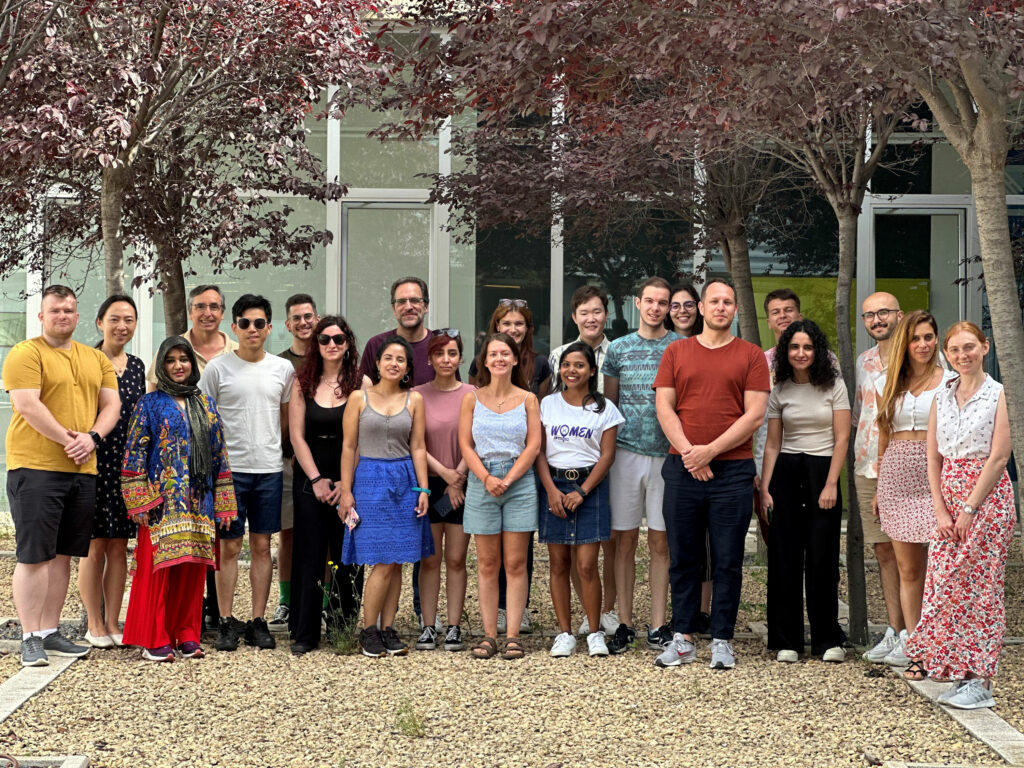ALS1: Protein Stabilization: Design, Experiments and Assessment (ProteSta)
Dates: 3rd-7th July 2023
Location: Institute BIFI, Zaragoza, Spain (BIFI-LACRIMA)
Full address: Institute BIFI, Edificio I+D, C/ Mariano Esquillor s/n, 50018, Zaragoza
Number of participants: 20
It is no longer possible to apply for this course.

Description of the course:
Primary scientific and technical work with proteins, as well as downstream applications, require having a sufficiently stable sample. This advanced-level course is aimed at biologists, immunologists, pharmacologists, biochemists, structural biologists, etc., who want to deepen their knowledge of the theoretical and practical aspects related to protein stability and the experimental and computational methodologies available to evaluate and improve the structural stability of proteins.
The objective is to provide a description of the theoretical and practical considerations for performing experimental assays, the tools and protocols to be applied in order to quantify protein stability, and design and formulation principles useful for tuning protein stability in practice.
The course will cover different biophysical techniques such as fluorescence spectroscopy, circular dichroism, and differential scanning calorimetry, as well as different approaches for protein engineering directed at improving stability. The sessions will be complemented with practical tutorials on data analysis and computational calculations, followed by critical discussion of the results. Participants will have the opportunity to describe their own projects related to protein stability.
Outline of the course:
The course will start on the morning of Monday 3rd of July and end on Friday 7th of July in the afternoon, and will combine both theoretical and practical content.
The course will provide time slots for exchange between the tutors and participants, as well as between the students. At the end of the course, the students are expected to have acquired the skills needed to apply the techniques at their institution in full autonomy.
The course will provide theoretical lectures (18 h) and practical tutorials (14 h) on protein stability assessment and design.
- Why assess/improve protein stability?
- Principles of protein stability
- Physical formalism and unfolding models
- Experimental approaches: spectroscopy and calorimetry
- Data analysis
- Extrinsic and intrinsic factors affecting protein stability
- Computational tools for protein stability
- Computational design for stabilizing proteins
- Protein stability in life and disease
Other details:
The course is aimed at researchers with some experience in protein purification and characterization who wish to acquire new scientific and technical skills: graduate and PhD students, postdoctoral fellows, early career scientists, technicians, and core facility staff.
The course will be open to 20 selected participants who come from places where such training is not available locally or in close proximity. The scientific committee will favour the selection of candidates who work or study in institutions without expertise in these types of methodologies and technologies. The participants should show that the outcome of the course will be used directly in their projects and activities.
Registration to the course will be free of charge. In addition, the selected participants will enjoy:
- 5 nights accommodation in Zaragoza (check in Sunday 2nd July, check out Friday 7th July)
- Daily lunches and coffees
- up to 300 € in travel expenses (fully documented).
Download a pdf version of a flyer for this course via the link below:
The MOSBRI advanced level school, ALS1, was held at Institute BIFI in Zaragoza (BIFI-LACRIMA) in July 2023.
The participants of the MOSBRI school ALS1, Protein Stabilization: Design, Experiments and Assessment (ProteSta) had the opportunity to review theoretical concepts and practical procedures to study protein stability experimentally and computationally. The school was very much appreciated by the participants, both for its content and its format. The group of participants was very active and interacted intensively with the teachers and with each other.
Course programme
Monday 3rd July 2023
| 09:00 | Opening presentation |
| 09:15 | Principles of protein stability (I) |
| 10:30 | Break |
| 11:00 | Principles of protein stability (II) |
| 13:00 | Lunch |
| 15:00 | Analysis of spectroscopic unfolding assays |
| 17:00 | Break |
| 17:30 | Short talks (I) |
Tuesday 4th July 2023
| 09:00 | Differential scanning calorimetry (DSC) |
| 10:30 | Break |
| 11:00 | Differential scanning fluorimetry (DSF) |
| 12:00 | Visit to experimental facilities/Experimental guidelines |
| 13:00 | Lunch |
| 15:00 | Analysis of DSC & DSF unfolding assays |
| 17:00 | Break |
| 17:30 | Short talks (II) |
Wednesday 5th July 2023
| 09:00 | Stabilisation through formation and mutagenesis (I) |
| 10:30 | Break |
| 11:00 | Stabilisation through formation and mutagenesis (II) |
| 12:00 | Visit to experimental facilities/Experimental guidelines |
| 13:00 | Lunch |
| 15:00 | Molecular dynamics simulations for stability calculations |
| 17:00 | Break |
| 17:30 | Poster session (I) |
Thursday 6th July 2023
| 09:00 | Computational tools for protein stabilisation (I) |
| 10:30 | Break |
| 11:00 | Computational tools for protein stabilisation (II) |
| 13:00 | Lunch |
| 15:00 | Protein stability: biotechnology and biomedicine |
| 17:00 | Break |
| 17:30 | Poster session (II) |
Friday 7th July 2023
| 09:00 | Round table discussion |
| 10:30 | Break |
| 11:00 | Group discussion of the course |
| 12:00 | Survey |
| 12:30 | End of the course |
Course material
Lecture – Principles of protein stability
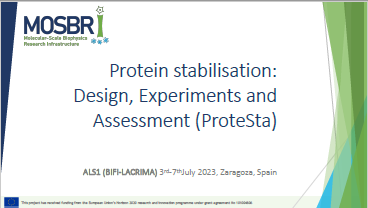
Lecture – Protein unfolding data analysis – Spectroscopy
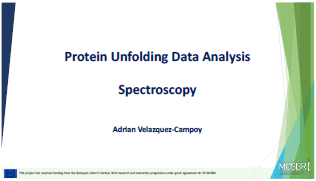
Lecture – Protein unfolding data analysis
– DSC and DSF
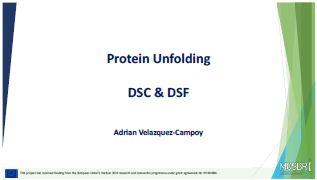
Lecture – Protein unfolding data analysis
– DSC and DSF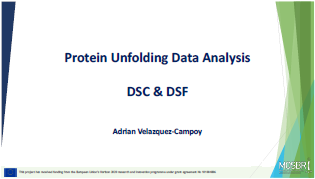
Lecture – Protein unfolding data analysis
– Experimental guidelines
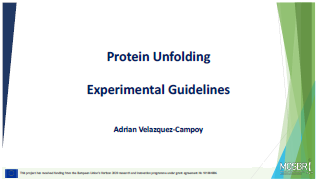
Lecture – Stabilisation by formation and
mutagenesis
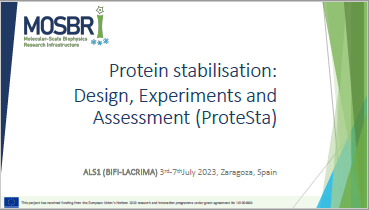
Lecture – Molecular dynamics simulations and stability calculations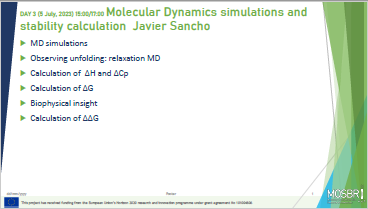
Lecture – Computational tools for protein
stabilisation
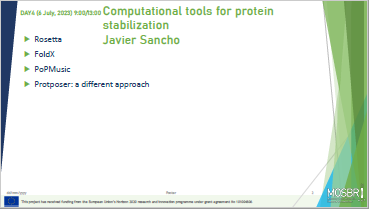
Lecture – Protein stability – Biotechnology
and biomedicine

Application to take part in the course
The course is limited to 20 participants and therefore any interested parties will need to submit an application for consideration to take part.
Who is eligible to apply:
Anyone with a workplace/host institution in one of the EU member or associated states may apply to attend this course (this includes people from the UK). Applicants from industry are also welcome. It is expected that the applicant has at least a basic knowledge of molecular biology, biochemistry and/or biophysics and that the topic of the course is applicable to their area of research/work. Applications from scientists in the early-stage of their career are particularly encouraged and we will strive to obtain a gender balance of the participants in the course.
How to apply:
The application consists of:
- submission of a completed course application form which includes:
- motivation for attendance
- a short scientific CV
- if you are a student or postdoc, a reference letter.
Once the application period is closed, all submissions will be reviewed and the applicants will be informed of the outcome.
When to apply:
It is no longer possible to apply for this course. The applications received are under review and applicants will be informed once a decision has been made.
Application deadline:
The deadline for submission of an application to participate in this course was the: 31st May 2023. 20th May 2023
